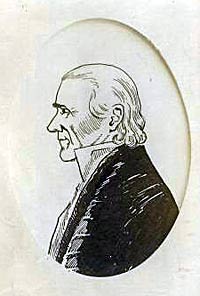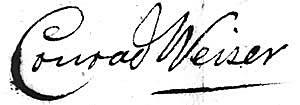Readings:
Psalm
122
Job 5:8-9,
20-27
2
Corinthians 5:16-20
John 16:33–17:5
Preface of the Epiphany
PRAYER (traditional language)
Almighty God, of thy grace thou didst endue Conrad Weiser with the gift
of diplomacy, the insight to understand two different cultures and interpret
each to the other with clarity and honesty: As we strive to be faithful
to our vocation to commend thy kingdom, help us to proclaim the Gospel
to the many cultures around us, that by thy Holy Spirit we may be effective
ambassadors for our Savior Jesus Christ; who with thee and the same Holy
Spirit livest and reignest, one God, now and for ever. Amen.
PRAYER (contemporary language)
Almighty God, of your grace you gave Conrad Weiser the gift of diplomacy,
the insight to understand two different cultures and interpret each to
the other with clarity and honesty: As we strive to be faithful to our
vocation to commend your kingdom, help us to proclaim the Gospel to the
many cultures around us, that by your Holy Spirit we may be effective
ambassadors for our Savior Jesus Christ; who with you and the same Holy
Spirit lives and reigns, one God, now and for ever. Amen.
This commemoration appears in A Great Cloud of Witnesses.
Return to Lectionary Home Page
Webmaster: Charles Wohlers
Last updated: 11 May 2019
CONRAD WEISER
WITNESS TO PEACE and RECONCILIATION, 1760
 Conrad
Weiser (November 2, 1696 – July 13, 1760), born Johann Conrad Weiser,
Jr., was a German Pennsylvanian pioneer, interpreter and effective diplomat
between the Pennsylvania Colony and Native Americans. He was a farmer,
soldier, monk, tanner, and judge as well. He contributed as an emissary
in councils between Native Americans and the colonies, especially Pennsylvania,
during the French and Indian War.
Conrad
Weiser (November 2, 1696 – July 13, 1760), born Johann Conrad Weiser,
Jr., was a German Pennsylvanian pioneer, interpreter and effective diplomat
between the Pennsylvania Colony and Native Americans. He was a farmer,
soldier, monk, tanner, and judge as well. He contributed as an emissary
in councils between Native Americans and the colonies, especially Pennsylvania,
during the French and Indian War.
Conrad Weiser was born in 1696 in the small village of Affstätt in the Duchy of Württemberg (now part of Germany). Conrad Weiser and his family were among thousands of refugees who left German lands in 1709, many of them from the Palatine area. The Weiser family eventually ended up in the Schoharie Valley of New York. At age 16, Conrad's father agreed to a chief's proposal for the youth to live with the Mohawks in the upper Schoharie Valley. During his stay in the winter and spring of 1712-1713, Weiser learned much about the Mohawk language and the customs of the Iroquois, while enduring hardships of cold, hunger, and homesickness. Conrad Weiser returned to his own people towards the end of July 1713.
On November 22, 1720, at the age of 24, Weiser married the young German girl Anna Eve Feck (Faeg). In 1723 the couple followed the Susquehanna River south out of New York and settled their young family on a farm in Tulpehocken near present-day Reading, Pennsylvania. The couple had fourteen children, but only seven reached adulthood.
Weiser's colonial service began in 1731. The Iroquois sent Shikellamy, an Oneida chief and friend of Weiser, as an emissary to other tribes and the British. The Iroquois trusted him and considered him an adopted son of the Mohawks. Weiser impressed the Pennsylvania governor and council, which thereafter relied heavily on his services.

During the winter of 1737, Weiser attempted to broker a peace between southern tribes and the Iroquois. He had to survive high snow, freezing temperatures and starvation rations just to make the six-week journey to the Iroquois capital of Onondaga (near persent-day Syracuse, NY). Impressed with his fortitude, the Iroquois named Weiser Tarachiawagon (Holder of the Heavens). Spill-over violence from a war between the Iroquois and southern tribes such as the Catawba would have drawn first Virginia, and then Pennsylvania, into conflict with the Iroquois. Therefore this peace-brokering had a profound effect on Native American/colonial relations.
Throughout his decades-long career, Weiser built on his knowledge of Native American languages and culture. He was a key player in treaty negotiations, land purchases, and the formulation of Pennsylvania's policies towards Native Americans. Because of his early experiences with the Iroquois, Weiser was inclined to be sympathetic to their interpretation of events, as opposed to the Lenape or the Shawnees. This may have exacerbated Pennsylvanian-Lenape/Shawnee relations, with bloody consequences in the French and Indian Wars.
Nevertheless, for many years, Weiser helped to keep the powerful Iroquois allied with the British as opposed to the French. This important service contributed to the continued survival of the British colonies and the eventual victory of the British over the French in the French and Indian Wars.
Between 1734 and 1741, Weiser became a follower of Conrad Beissel, a German Seventh Day Baptist preacher. For six years, he lived at the monastic settlement, Ephrata Cloister, in Lancaster County, Pennsylvania.
Conrad was also teacher and a lay minister of the Lutheran Church; he was one of the founders of Trinity Church in Reading.
Weiser died on his farm on July 13, 1760. Upon his death, one Iroquois Indian noted to a group of colonists, "We are at a great loss and sit in darkness ... as since his death we cannot so well understand one another." Indeed, shortly after Conrad Weiser's death, relations between the colonists and the Native Americans began a rapid decline.
— more at Wikipedia and the Conrad Weiser Homestead State Park